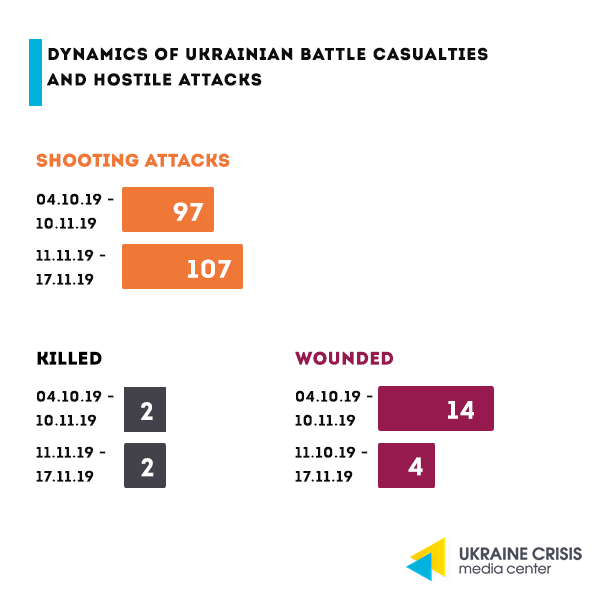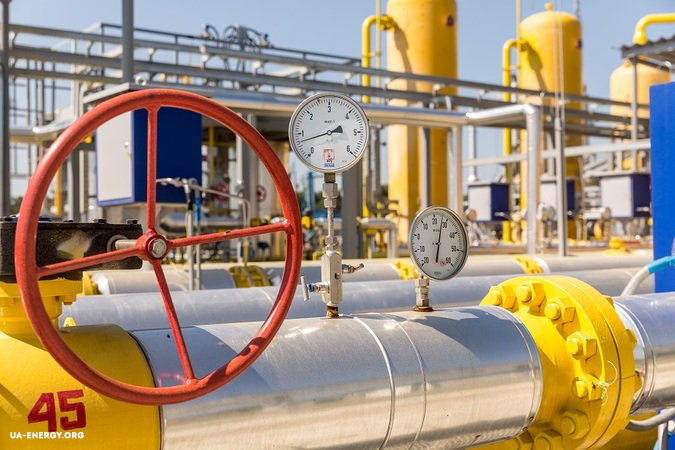Situation in the combat zone

Russia-backed militants fired upon the Joint Forces’ Position from Minsk-proscribed 82-mm and 120-mm mortars as well as from weapons mounted on infantry-fighting vehicles, grenade launchers, heavy machine guns and small arms. Ukrainian troops also recorded hostile sniper fire.
Joint Forces Operation Staff reports that Russian proxies of the so-called “DPR” are provoking Ukrainian troops in try to derail disengagement of troops near the site no.3 (Bohdanivka – Petrivske).
Joint Forces Operation Staff says militants kept firing for two days in a row near Bohdanivka and Petrivske.
The December 9 Normandy-format meeting: what to expect

Place and time of the meeting agreed. All “Normandy format” participants agreed to a meeting in Paris on December 9 as stated by the press service of the President of Ukraine Volodymyr Zelenskyi that quotes his telephone call with the President of France Emmanuel Macron. “The President of France emphasized that Ukraine fulfilled all the necessary conditions for the ‘Normandy format’ meeting to happen. As a result all parties accepted the meeting date – December 9 in Paris,” the statement reads. The Presidents of Ukraine and France agreed preparations to the substantial part of the high-level meeting.
Putin’s statement. The law on the special status of Donbas has to be extended otherwise there will be nothing to discuss at the Normandy-format summit, the President of the Russian Federation Vladimir Putin said. “There is an important circumstance: on December 31 the law on the special status of Donbas expires. If it is not extended (…) European partners actually raised the question and directly asked Ukraine to make this law a permanent one. Poroshenko did agree to it but nothing has been done,” Putin told journalists.
Russia returns warships seized in the Kerch Strait to Ukraine. The warships seized by the Russian border service near the Kerch Strait last year are being transferred to Ukraine, Nikolai Polozov, head of the lawyers’ group defending Ukrainian sailors told Interfax on Sunday: “My information says the warships are being now taken from Kerch to be handed over to Ukraine.” Polozov explained that the transfer of the warships to Ukraine may mean they had been removed from the physical evidence list or that they are transferred for due storage.
Foreign Affairs Minister of Ukraine: “two possible options for meeting results”. The Minister of Foreign Affairs of Ukraine Vadym Prystaiko hopes for a breakthrough during the meeting of the leaders of Ukraine, Russia, France and Germany scheduled for December 9. He said a restrained communique that summarizes the meeting results has been drafted.
“There are two approaches. The first one – let us control our expectations and not set too ambitious goals for ourselves, so that later if no way to implement them is found, we would not say that the progress is not reached and that we even rolled back. It is a cautious approach captured in a brief communique that we have discussed,” the Foreign Affairs Minister said.
“We have drafted this document, all the four parties have agreed it. It is a working document that foreign policy advisors to heads of the states recommend their leaders,” he added.
“Should a breakthrough be achieved in course of the leaders’ discussion, and that is what we would like to hope for, a new document will be quickly drafted. For example, (if) all four leaders agree that the war needs to be ended and there are three-four steps to be made. It is an ideal scenario but our expectations are now based on the minimum possible option,” Prystaiko said.
He emphasized that “the brief communique that has been drafted even foresees that before the meeting the exchange of prisoners will have already happened and our warships (seized in the Kerch Strait) will have been returned.”
“The cautious option has it all and these are absolutely concrete issues. The document is a cherry on top,” the Minister said.
The law on Naftogaz unbundling comes into force

President Volodymyr Zelenskyi signed the law on unbundling of NJSC Naftogaz of Ukraine separating the function of transportation of natural gas from its production and supply. The news was reported by the deputy head of the President’s Office Yulia Kovaliv.
“The law sets due conditions for Ukraine to implement its commitments of separating gas transportation and regulating activities of the gas transmission system operator in accordance with the European law.
Despite the attempts to block or protract adoption of decisions, Ukraine is confidently moving towards European integration demonstrating readiness to certify the operator of the gas transmission system in accordance with the EU rules and the Third Energy Package,” Yulia Kovaliv wrote.
To remind, completing unbundling is a condition of the Ukraine-EU Association Agreement and of the Protocol on the Accession of Ukraine to the Energy Community Treaty. After the procedure is completed Naftogaz will no longer be a monopolist in mainline gas transportation. Effective January 1, 2020 NJSC Naftogaz will have no impact on operations of the new independent operator.
Who will be transporting the gas? The document foresees that a separate company will be created – “Operator of the Gas Transmission System”. The new operator has to maintain independence not only from its former owner – “Naftogaz” but also from any other possible influence on the part of producers and suppliers of gas and electrical energy, independence is to be guaranteed by the state.
Who needs unbundling? It is one of the key EU requirements for Ukraine and a necessary precondition for signing a new transition contract with Russia. Unbundling is actually a system for internal corporate reorganization to separate businesses.
A few years ago in the framework of its agreements with the Energy Community Ukraine committed to separating transportation, storage, production and sales of gas. All these functions were previously carried out by Naftogaz and its subsidiary Ukrtransgaz.
When will the separation happen? Until January 1, 2020assets of the gas transportation system will be owned by Naftogaz, on November 1 asset management will be transferred to the independent operator “Operator of the Gas Transmission System of Ukraine” LLC (GTS Operator), a “subsidiary” of Ukrtransgaz.
GTS Operator will be transferred to the “Main Gas Pipelines of Ukraine” PJSC (Mahistralni gazoprovody Ukrainy) to be managed by the Finance Ministry.
After the separation Naftogaz will lose its ownership right on the gas transmission system, the state and the Finance Ministry in particular will become its new rightful owner. Unbundling process will be completed. The draft law on unbundling guarantees that Ukraine’s gas transmission system will remain state-owned.
How will it affect negotiations with Russia? Ukrainian officials claim that the approved draft law will improve Kyiv’s position in the upcoming gas negotiations with Gazprom on the transit contract.
Ukraine insists on signing the contract based on EU rules, to achieve that an independent operator that will sign the agreement with the Russian monopolist needs to be established. According to expert Hennadiy Ryabtsev approval of the law will not have a considerable impact on gas negotiations but may speed them up a bit.
“Setup of an independent operator certified in accordance with European rules can have a positive effect. Approval of the law is just one of the steps towards creating it,” the expert said.
“I very much doubt that all procedures will be finalized and the legal entity that will have all powers to sign the contract will be created in due terms,” the expert added.
President of the Centre for Global Studies “Strategy XXI” Mykhailo Honchar is of a different opinion: “I see no unsurmountable obstacles to make it in time. There can be certain technical issues though.”
Honchar agrees that it will not affect Ukraine’s position in negotiations. “One should not expect Russia to be content. They will be looking for inconsistencies, there is already a decision on acting on the crisis situation, no one is going to refuse it,” he said.
Opinion polling: Ukrainians on the church and its role in the state

The Razumkov Centre held the survey “The state and the church”. The organization interviewed 2015 respondents over 18 years of age all across Ukraine but in Crimea and temporarily occupied areas in Donetsk and Luhansk regions. The survey was held between October 4 and 9, 2019. The surveys are annual.
Importance of religion goes down. Sociologists recorded the lowest number of religious people since 2010. It is confirmed by other figures as well. Answers to questions whether religion is important to them and if being religious is an important quality are now less frequent.
The church as a moral authority. The number of respondents holding the church for their moral authority has decreased inconsiderably against the last year’s figure. Considered dynamically it is quite an obvious trend. In nine years the number of respondents considering the church their moral authority decreased by 13 per cent. At the same time the number of those who do not consider the church a moral authority grew by 12 per cent.
The church and the state. The survey shows that Ukrainians give very little support to the idea of establishing a state-run church (9,3 per cent), introducing mandatory religious studies at school (13 per cent) but do support the service of chaplains in the army (61,7 per cent). Only 15,5 per cent want to impose taxes on the church, while 46 per cent think churches need to operate as common NGOs enjoying no gas discounts or tax benefits.
Religion and politics. The survey brings another important finding. Respondents were asked about their attitude towards politicians who are being religious in public. As much as 13 per cent of respondents are positive about it, 38,6 per cent have a negative attitude, 41 per cent are indifferent. These figures demonstrate that being religious does not translate into popularity with voters. It also explains why despite massive public support to the idea of autocephaly and approval of the Tomos granted, Petro Poroshenko lost elections to Zelenskyi who contemptuously called it thermos in his show. Tomos and elections are separate. It is an important case for politicians. Sociologists say that demonstration of one’s affection to the church does not add voters.





